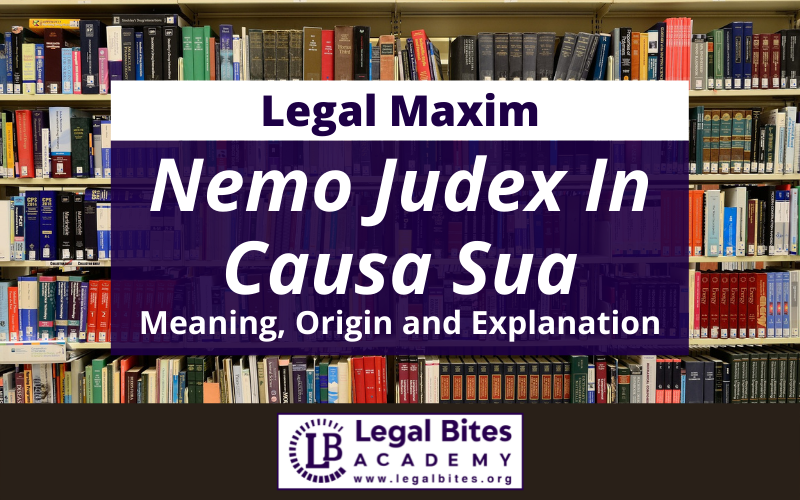Nemo Judex In Causa Sua: Meaning, Origin and Explanation
This article titled ‘Nemo Judex In Causa Sua: Meaning, Origin and Explanation’ is written by Sahajpreet Bhusari and discusses the maxim of Nemo Judex in Causa Sua. I. Meaning and Origin Nemo Judex In Causa Sua is a legal phrase of Latin origin. The phrase literally means ‘no one can be a judge in their own case’[1]. II. Explanation The… Read More »

This article titled ‘Nemo Judex In Causa Sua: Meaning, Origin and Explanation’ is written by Sahajpreet Bhusari and discusses the maxim of Nemo Judex in Causa Sua. I. Meaning and Origin Nemo Judex In Causa Sua is a legal phrase of Latin origin. The phrase literally means ‘no one can be a judge in their own case’[1]. II. Explanation The principle behind the maxim says that no one can judge their own case. It is said to be because it contradicts the principles of natural...
This article titled ‘Nemo Judex In Causa Sua: Meaning, Origin and Explanation’ is written by Sahajpreet Bhusari and discusses the maxim of Nemo Judex in Causa Sua.
I. Meaning and Origin
Nemo Judex In Causa Sua is a legal phrase of Latin origin. The phrase literally means ‘no one can be a judge in their own case’[1].
II. Explanation
The principle behind the maxim says that no one can judge their own case. It is said to be because it contradicts the principles of natural justice. The principle of natural justice is often considered the principle of anti-bias; which simply says that a person should not judge his own case or any case that concerns him.
This principle has been recognized as a means to prevent one from transcending the ideals of justice and fair play. It has been argued that in order to build trust in the justice system, justice must not only be done but also seen. The rule simply states that the person having jurisdiction must be fair and unbiased.
The basic principle is very simple and states that bias is inevitable when the judge of the case has any interest, whether it is a personal bias, i.e. a judge her own case or a case against her among her relatives; money bias when a judge or arbitrator acts in part under the influence of money advantage; formal bias in which biased behaviour crept in due to the influence of position.
It is a well-established fact that the possibility of bias is sufficient to invalidate the right to decide and evidence of actual bias is not necessary. Needless to say, a person who hears his own case will be incapable of administering justice and thus impede the aim of law and order in society.
III. Illustrations
Anuj is Bikram’s father and a judge in the district court where the Bikram murder case was filed. It should be noted that in this case, Anuj is incompetent to hear this case because his son is charged in the case and personal bias is inevitable. Therefore, for the ultimate guarantee of justice, it is advised that anyone with an interest in the case must avoid making any decision on the case and that the case shall be passed on to another judge of competent jurisdiction.
IV. Case Laws
In the case of Yunus Khan v. State of Uttar Pradesh and Ors.[2], the legal maxim was upheld and the court held that in cases where the accused himself is the judge or is in fiduciary relations with the judge presiding over then the judgment passed in such cases shall not be considered valid.
In the case of Sri K. Vijaya Bhaskar Reddy v. Government of Andhra Pradesh and Ors[3], as well, the maxim was upheld and it was stated that rule against bias plays a major role in determining the principle of equity and justice.
References
[1] Nemo Judex In Causa Sua, Available Here, Accessed on 11/11/2021.
[2] (2010) 10 SCC 539.
[3] AIR 1996 AP 62.

